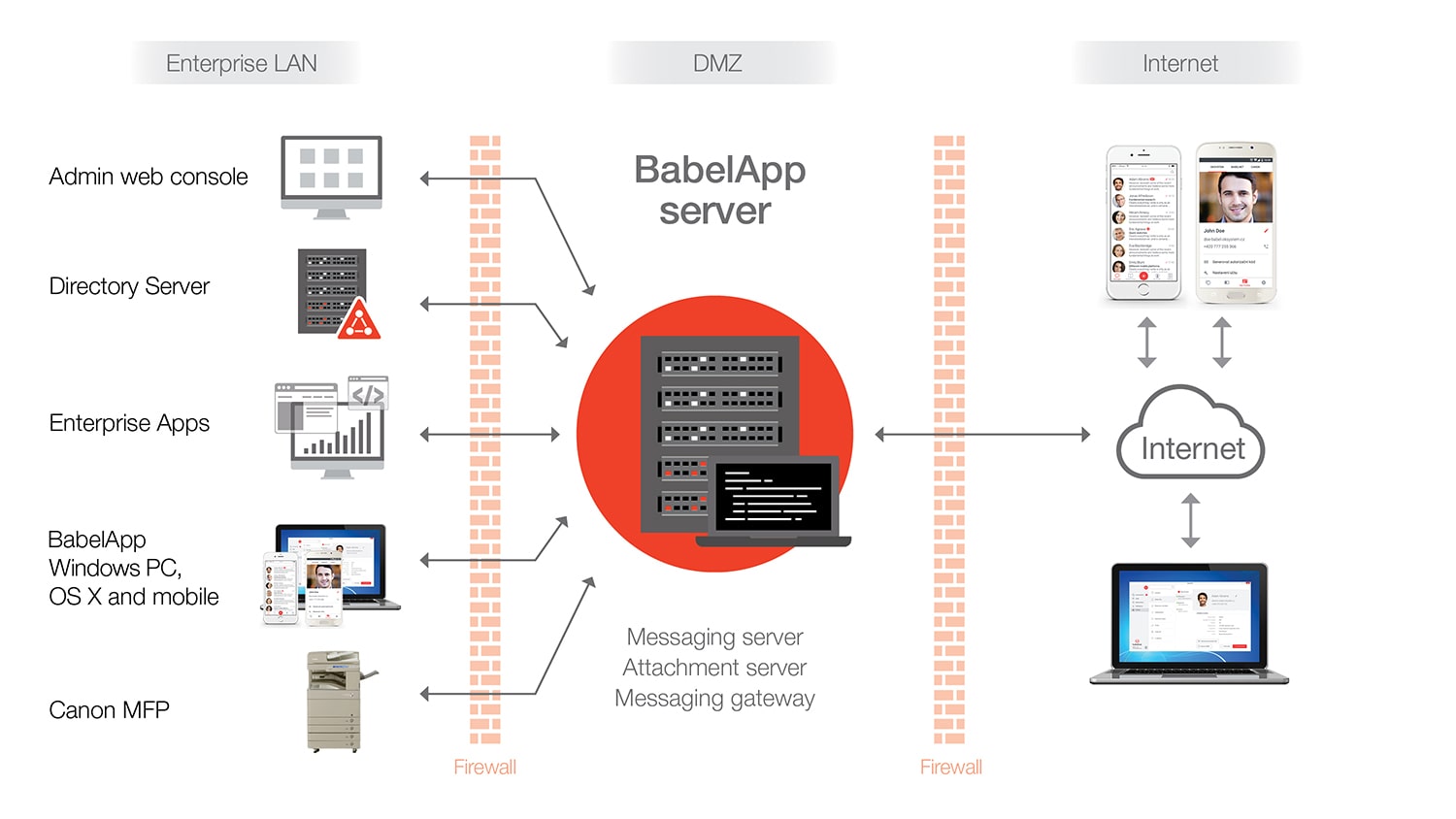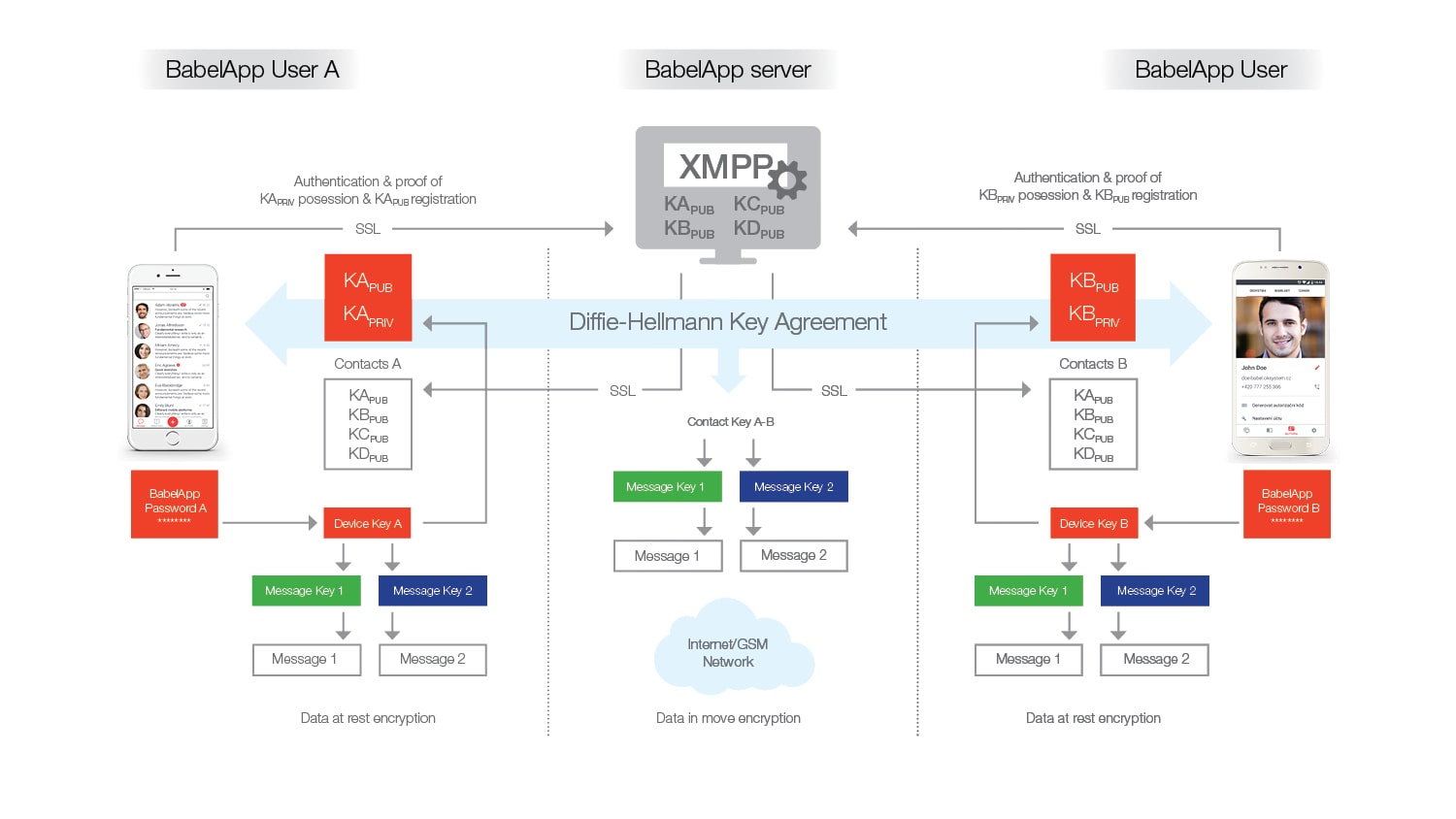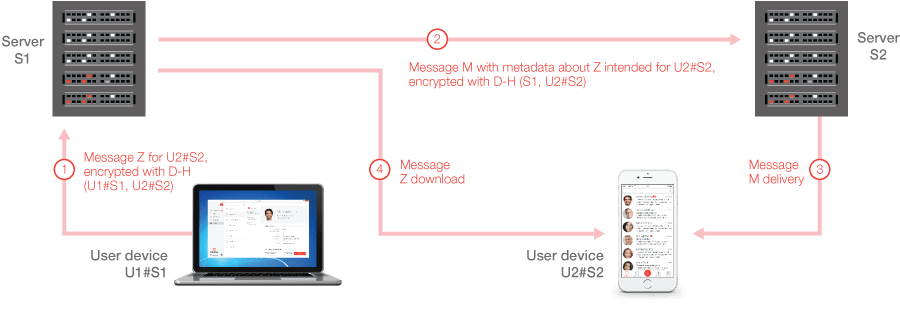Technology
Overview
BabelApp is an instant messaging platform for secure communication. It enables encrypted messages and documents to be sent and stored on both mobile (iOS, Android, BlackBerry) and desktop devices (Windows, MacOS). BabelApp combines the best cryptographic algorithms and protocols to protect your communication and information against both active and passive cyber-attacks.

Encryption technology
Every message is encrypted using a standard AES symmetric-key algorithm with a unique Message Key that is randomly generated by the BabelApp application on the sender's device. The recipient needs to obtain the Message key to decrypt the actual message, therefore the Message Key has to be kept encrypted while not used – that is done by use of another encryption key – a Contact Key which the sender shares with the recipient. Contact keys are attached to messages. Contact Keys are not saved anywhere, they are calculated during the transmission using a standard Diffie-Hellman algorithm. For this calculation to happen, each party needs to possess a verified value of the other party's public key. Public keys are securely distributed to all registered mobile devices via thea BabelApp Messaging Server.

Blockchain technology
Our application uses a unique mechanism for key authentication, which works with modern secure storage, where it is excluded that anyone would be able to modify once entered data in any aspect. This storage is called Blockchain database.
Public Blockchain DB are currently used exclusively for cryptocurrency. The largest and the safest one is used by Bitcoin. Except of using this DB for recording of particular Bitcoin transactions, it is also possible to record other data. In our case, endpoint device with BabelApp application records to this database information needed for public key verification, which can be read anytime by other participants in this communication. If BabelApp server has active Bitcoin network, protection, anyone can communicate with you without having fear of being attacked by MITM, with no necessity of calling and verifying public keys before commencement of the communication.
Encrypted calls
BabelApp provides encrypted calls between mobile devices within the data network through VoIP. The voice is transmitted directly between end-users using an internet connection or through a TURN server (Traversal Using Relays around NAT) when the connection is relayed.
BabelApp provides a secure voice transmission using a SRTP (Secure Real Time Protocol) encryption. "Perfect Forward Secrecy" searches for encryption keys. This means that if the DH keys or relay session keys are compromised, no other keys will be compromised.
Sending messages
Messages, once encrypted, are sent to the BabelApp Messaging Server (BMS) for delivery. BMS notifies the recipient that have a new message waiting to be delivered and enables the recipient to download the message. Should the message contain an attachment, a preview is sent along with message as well as a link for asynchronous download of the original attachment. The BabelApp server administrator can set the maximum time period for which it is possible to access and download attachments. Should the attachment expires, it is automatically deleted from the server.
Communication across multiple BabelApp servers is described below:

Data storage
Sent and received messages are stored on mobile devices are kept encrypted using randomly generated Message Keys. Message Keys need to be protected, therefore they are encrypted using Device Keys. Device Keys are randomly generated on mobile devices during installation of the application. Device Keys are then encrypted and protected by additional keys derived from passwords that users set during application installation.
In order to display messages, users are prompted to enter their password from which the above mentioned key is derived. Such a key is then used to temporarily decrypt the Device Key. Once the Device key is available, it is possible to decrypt the Message key and view messages.
Active attacks security
BabelApp’s security is not based on encryption only, but also on authentication and integrity control to ensure that messages have not been changed, altered, or viewed by someone else and that all messages come from authenticated – verified users. Therefore all messages sent via BabelApp are not only encrypted but also digitally signed using an HMAC algorithm with authentication keys (Encrypt-then-Authenticate). Messages are also numbered / sequenced and the BabelApp application detects and deletes messages with non-valid sequence numbers. A warning is subsequently displayed to affected users.